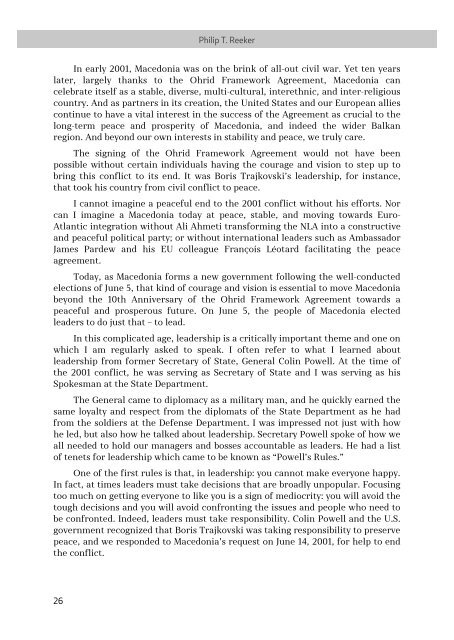Download - South East European University
Download - South East European University
Download - South East European University
You also want an ePaper? Increase the reach of your titles
YUMPU automatically turns print PDFs into web optimized ePapers that Google loves.
Philip T. Reeker<br />
In early 2001, Macedonia was on the brink of all-out civil war. Yet ten years<br />
later, largely thanks to the Ohrid Framework Agreement, Macedonia can<br />
celebrate itself as a stable, diverse, multi-cultural, interethnic, and inter-religious<br />
country. And as partners in its creation, the United States and our <strong>European</strong> allies<br />
continue to have a vital interest in the success of the Agreement as crucial to the<br />
long-term peace and prosperity of Macedonia, and indeed the wider Balkan<br />
region. And beyond our own interests in stability and peace, we truly care.<br />
The signing of the Ohrid Framework Agreement would not have been<br />
possible without certain individuals having the courage and vision to step up to<br />
bring this conflict to its end. It was Boris Trajkovski’s leadership, for instance,<br />
that took his country from civil conflict to peace.<br />
I cannot imagine a peaceful end to the 2001 conflict without his efforts. Nor<br />
can I imagine a Macedonia today at peace, stable, and moving towards Euro-<br />
Atlantic integration without Ali Ahmeti transforming the NLA into a constructive<br />
and peaceful political party; or without international leaders such as Ambassador<br />
James Pardew and his EU colleague François Léotard facilitating the peace<br />
agreement.<br />
Today, as Macedonia forms a new government following the well-conducted<br />
elections of June 5, that kind of courage and vision is essential to move Macedonia<br />
beyond the 10th Anniversary of the Ohrid Framework Agreement towards a<br />
peaceful and prosperous future. On June 5, the people of Macedonia elected<br />
leaders to do just that – to lead.<br />
In this complicated age, leadership is a critically important theme and one on<br />
which I am regularly asked to speak. I often refer to what I learned about<br />
leadership from former Secretary of State, General Colin Powell. At the time of<br />
the 2001 conflict, he was serving as Secretary of State and I was serving as his<br />
Spokesman at the State Department.<br />
The General came to diplomacy as a military man, and he quickly earned the<br />
same loyalty and respect from the diplomats of the State Department as he had<br />
from the soldiers at the Defense Department. I was impressed not just with how<br />
he led, but also how he talked about leadership. Secretary Powell spoke of how we<br />
all needed to hold our managers and bosses accountable as leaders. He had a list<br />
of tenets for leadership which came to be known as “Powell’s Rules.”<br />
One of the first rules is that, in leadership: you cannot make everyone happy.<br />
In fact, at times leaders must take decisions that are broadly unpopular. Focusing<br />
too much on getting everyone to like you is a sign of mediocrity: you will avoid the<br />
tough decisions and you will avoid confronting the issues and people who need to<br />
be confronted. Indeed, leaders must take responsibility. Colin Powell and the U.S.<br />
government recognized that Boris Trajkovski was taking responsibility to preserve<br />
peace, and we responded to Macedonia’s request on June 14, 2001, for help to end<br />
the conflict.<br />
26

















